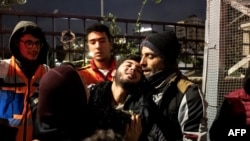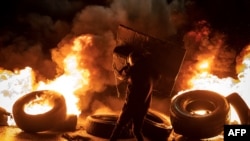Israel and Hamas are expected to carry out more exchanges of prisoners and hostages as a cease-fire extends into a fifth day Tuesday.
Israel had pledged to continue its pause in attacks targeting Hamas in the Gaza Strip by one day beyond the original, four-day pact for every 10 additional hostages Hamas releases and free three times that many Palestinians held in Israeli jails on various offenses. Hamas confirmed it had agreed to a two-day extension "under the same terms."
Qatar helped negotiate the extension, while the United States, which has been calling for a truce as long as hostages are being released, said it welcomed the extended cessation in fighting.
U.S. President Joe Biden said in a statement that the halt in warfare has “enabled a significant surge in additional humanitarian assistance to the innocent civilians who are suffering across the Gaza Strip.” He said the U.S. will not stop its diplomatic efforts until all hostages held by Hamas are freed.
"We'd certainly like to see even that extension extended further until all the hostages are released,” said John Kirby, director of strategic communications for the National Security Council. “That's really the goal here, to get all the hostages home with their families where they belong. And you know, however long that could take."
A fourth swap of hostages held by Hamas for Palestinian prisoners concluded late Monday, with the Israel Defense Forces saying that 11 hostages held by Hamas had been released and Israel’s prison authority saying 33 Palestinians freed. In all, 50 Israeli hostages and 150 Palestinians were freed during the initial four days.
While the extended cease-fire held out the prospect of a longer truce, Israel has remained adamant in its stated goal of crushing Hamas’ military capabilities and ending its 16-year rule over Gaza, the narrow territory along the Mediterranean Sea, after the shock October 7 Hamas attack on southern Israel that killed about 1,200 people and led to the Hamas capture of about 240 hostages.
The United States has called on Israel to avoid “significant further displacement” of people in Gaza as it turns the focus of its campaign against Hamas from the northern part of the Gaza Strip toward the southern end.
A senior U.S. official briefing reporters said the message has been communicated with the Israeli government, and that the Israeli military campaign needs to avoid attacks on power, water and humanitarian sites in southern Gaza.
Israel has told people to leave northern Gaza for the south as it mainly focused the initial part of its offensive against Hamas in the north.
The United Nations says an estimated 1.8 million people, or about 80% of Gaza’s population, are displaced within Gaza with 1.1 million sheltering in overcrowded U.N. facilities.
Israel’s campaign against Hamas militants has killed more than 14,000 people, according to Gaza health officials.
Hamas, a U.S.-designated terror group, and other allied militants could still be holding up to 175 hostages, enough to potentially extend the cease-fire for two and a half weeks.
But the hostage group includes a number of Israeli soldiers, and the militants could make stiffer demands for their release.
U.S. Secretary of State Antony Blinken, who attended a NATO meeting in Brussels Monday, will head to Israel and the West Bank late Wednesday, according to a senior State Department official.
Blinken has visited Israel multiple times on his previous two trips to the region since the Israel-Hamas war began.
In his meetings in the Middle East, Blinken “will stress the need to sustain the increased flow of humanitarian assistance to Gaza, secure the release of all hostages, and improve protections for civilians in Gaza,” a senior State Department official said on background.
Analysts say the widely welcomed pause is unlikely to bring an end to this complex — and for both sides, existential — conflict.
“There are two separate problems,” said Michael O’Hanlon, a senior fellow and director of research in foreign policy at the Brookings Institution. “The long-term end to the fighting is going to require the dismantlement of Hamas — probably not in any realistic way the complete elimination of all of its fighters or capabilities or ideas — but the top leadership has to go. Hamas’ ability to rule Gaza has to go. And I don't see that as having been changed in any way, shape or form by the current pause in the fighting.”
China said Monday its top diplomat, Wang Yi, will preside over a Wednesday United Nations Security Council meeting focused on the Israel-Hamas conflict.
Chinese Foreign Ministry spokesperson Wang Wenbin told reporters that China hopes the talks would lead to a prolonged cease-fire and an end to the fighting and alleviate the humanitarian crisis in Gaza.
The pause in fighting has allowed an increase in badly needed humanitarian aid to reach Gaza, where the U.N. says an estimated 1.8 million people — about three-quarters of the population — are displaced.
VOA State Department bureau chief Nike Ching and White House correspondent Anita Powell contributed to this article. Some information for this story came from The Associated Press, Agence France-Presse and Reuters.


